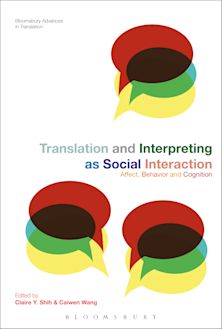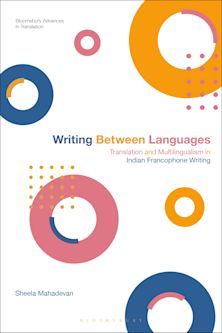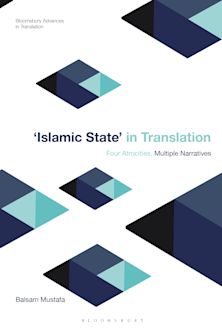- Home
- ACADEMIC
- Linguistics
- Translation and Interpretation
- Cognitive Explorations of Translation
Cognitive Explorations of Translation
This product is usually dispatched within 2-4 weeks
- Delivery and returns info
-
Flat rate of $10.00 for shipping anywhere in Australia
You must sign in to add this item to your wishlist. Please sign in or create an account
Description
Cognitive Explorations of Translation focuses on the topic of investigating translation processes from a cognitive perspective. With little published on this topic to date, Sharon O'Brien brings together a global collection of contributors covering a range of topics.
Central themes include modelling translation competence, construction and reformulation of text meaning, translators' behaviour during translation and what methodologies can best be utilized to investigate these topics. Techniques covered include eye-tracking, Think-Aloud protocols, keyboard logging and EEG (Electroencephalogram).
This book will be of interest to researchers and postgraduates in translation studies and cognitive linguistics as well as practicing translators.
Table of Contents
1. Back to basics: designing a study to determine the validity and reliability of verbal report data on translation processes, Riitta Jääskelainen
2. Results of the validation of the PACTE translation competence model: Translation project and dynamic translation index, PACTE Group
3. Exploring translation competence acquisition: criteria of analysis put to the test, Susanne Göpferich, Gerrit Bayer-Hohenwarter, Friederike Prassl and Johann Stadlober
4. Development of translation competence in novices: a corpus design and key logging analysis, Heloísa Pezza Cintrão
5. Uncertainty management, metacognitive bundling in problem solving, and translation quality, Erik Angelone and Gregory M. Shreve
6. EEG, EYE and Key: three simultaneous streams of data for investigating the cognitive mechanisms of translation, Christian Michel Lachaud
7. Translation directionality and the revised hierarchical model: an eye-tracking study, Vincent Chieh-Ying Chang
8. Towards an investigation of reading modalities in/for translation: an exploratory study using eye tracking data, Fabio Alves, Adriana Pagano and Igor da Silva
9. Cognitive effort in metaphor translation: an eye-tracking study, Annette Sjørup
10. Distribution of attention between source text and target text during translation, Kristian T.H. Jensen
Glossary of Terms
Index
Product details
| Published | 17 Feb 2011 |
|---|---|
| Format | Paperback |
| Edition | 1st |
| Extent | 256 |
| ISBN | 9781441172686 |
| Imprint | Continuum |
| Dimensions | 234 x 156 mm |
| Series | Continuum Studies in Translation |
| Publisher | Bloomsbury Publishing |
About the contributors
Reviews
-
"Trainers of translators tend to know what a good translation is. This knowledge results from their teaching experience and their knowledge of the professional market, but not always from empirical research. The contributors to this volume help to change that state of affairs: they make use of various methods (think aloud protocols, keylogging, eyetracking and cued retrospection) and their results are of great interest to those in practical and theoretical translation studies."
Paul Kussmaul, Department of Translation, Linguistics and Cultural Studies at the University of Mainz, Germany
-
"This collective volume reflects recent trends in cognitive translation process research. Some articles deal primarily with theoretical and methodological issues; others show applications of introspective methods and software like keystroke-logging, screen recording, eye-tracking, pupillometrics and EEG. Several exploratory studies using various method combinations are reported and discussed. Aspects considered include translation competence development, uncertainty management, the cognitive load under different reading modalities or when translating from and into L1, eye-tracking of metaphor translation, distribution of attention between source text and target text, and limits on cognitive processing. In some of the studies, the cognitive effort involved in translating is investigated in groups with different degrees of expertise; processes of students or novice translators are compared with the processes of professional translators - with the primary aim of improving translation competence acquisition."
Professor Gyde Hansen, Department of International Language Studies, Copenhagen Business School, Denmark



































